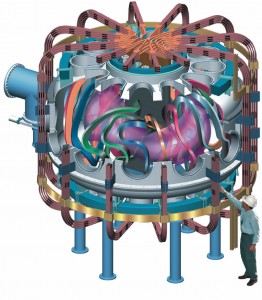
Washington Post: “Budget cuts threaten pursuit of nuclear fusion as a clean energy source”
 The Washington Post has a feature article, “Budget cuts threaten pursuit of nuclear fusion as a clean energy source,” leading their “Health & Science” section by Brian Vastag about the the threatened budget cuts to the Magnetic Fusion Program.
The Washington Post has a feature article, “Budget cuts threaten pursuit of nuclear fusion as a clean energy source,” leading their “Health & Science” section by Brian Vastag about the the threatened budget cuts to the Magnetic Fusion Program.
This is a subject that ASP has been following closely since the budget was first released in February, when BGen Stephen A. Cheney USMC (Ret.) , ASP’s CEO, wrote that we were “shocked and appalled that the Administration’s budget for the Department of Energy cuts crucial funding for fusion energy sciences.” We have since detailed the “Tough Budget for Fusion” and written that “It’s Time for Magnetic Fusion to Have a Seat at the Energy Table.”
Further, ASP’s Fact Sheet and White Paper on Fusion Energy outline how this next-generation energy source gives America an opportunity to once again lead the world in science and technology development – a crucial part of America’s place as a world leader. Earlier this month, we brought in some of the country’s leading scientists to an event, “Magnetic Fusion Energy – Steps to Commercialization” in order to discuss a plan for how to get to commercial fusion energy within a time-frame that would be meaningful.
Vastag’s article details how the proposed budget for fusion would undermine the decades of research into fusion. He interviews many of the leading scientists in the field, including Martin Greenwald of MIT and Stewart Prager of Princeton.
It is ironic that the cuts in the fusion budget come at a time of heightened interest in clean energy. Often called the “Holy Grail” of energy research, it would seem that fusion energy should be at the top of the list. However, short-term political thinking (i.e. we only want something that will be done within 4 years) has combined with genuine scientific questions about how to get there to create uncertainty about the budget.
Unfortunately, as the article makes clear, if the research budget is not strong enough to continue this promising field, America will cede its scientific lead in this project to competing countries; China has begun a large program to build fusion reactors and train thousands of scientists. As Martin Greenwald says at the end of the article, the Chinese are basically saying “Thanks for 60 years of research; we’ll take it from here.”






[…] Washington Post: “Budget cuts threaten pursuit of nuclear fusion as … Go to this article […]